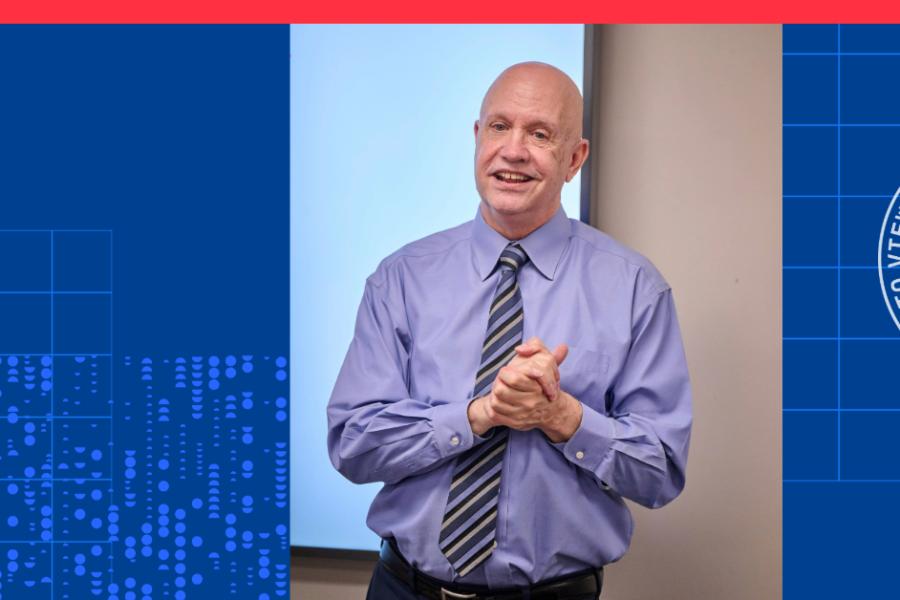
Doctor of Social Work (DSW)
Program Overview
The fully online Doctor of Social Work (DSW) program at the University of Kansas School of Social Welfare is designed to produce expert social work practitioner-scholars who go on to teach, supervise and mentor.
KU DSW courses help experienced social workers develop leadership and administrative skills. DSW students learn to translate social work research to help agencies understand and implement best practices found in the social work and social science literature.
Many KU DSW courses are devoted to the theory and practice of teaching. These courses prepare graduates to conduct their own classes, contribute to developing social work curriculum, and serve as skilled mentors and advisors to students.
The KU Doctor of Social Work is a completely online program. DSW classes meet live online every other Saturday, with additional online coursework outside of class time.
Designed for working professionals, the online DSW program allows students to continue working while earning their social work doctoral degree full-time.
DSW Quick Facts
DSW Curriculum
The KU DSW program requires 42 credit hours to complete the degree.
Courses fall into five domains:
- Ethical & Historical Frameworks
- Leadership & Administrative Practice Knowledge, Theories, and Skills
- Research & Inquiry
- Pedagogy & Instruction
- Capstone Portfolio Seminars
Visit the KU Academic Catalog for a full list of DSW Degree Requirements.
All DSW courses are required. There are no electives.
New KU DSW students begin courses in the fall term.
DSW Capstone Project
To meet the requirements of doctoral education in this practice degree, the DSW program requires the successful completion of a Capstone Project.
Because the DSW is not a research degree, the emphasis is not on conducting original empirical research and demonstrating mastery of research design and analytical methodologies. Rather, in the practice-centered DSW degree, the emphasis is on mastery of evidence-based academic literature in a particular area of social work practice and policy and the demonstration of knowledge, skills, and values in the implementation of those practices in existing community or agency practice settings.
In the KU DSW, our emphasis is on demonstrating leadership in the implementation of knowledge for the betterment of clients, organizations and communities.
The Capstone Project can take any number of forms, including but not limited to the following:
- Community change initiative
- Pilot study
- Intervention development and evaluation
- Measurement development for outcomes evaluation
- Program evaluation
- Evaluation of a clinical practice model
- Quality improvement related to practice, organizations, or community services
Program Length: Doctor of Social Work
The Doctor of Social Work degree at KU can be completed in two years of full-time study. Part-time students can complete the DSW degree in three or four years.
Program Format: Doctor of Social Work
The KU DSW program is 100% online. Students attend live, online classes every other Saturday, with additional online coursework outside of class time.
Invest in your Future

Admission Requirements
Applicants who meet the following criteria are eligible to apply to the DSW:
Required
- A master's degree in social work from a CSWE-accredited program or a Canadian Association for Social Work Education (CASWE) accredited Master of Social Work Program
- Minimum of three (3) years of clinical or macro practice experience beyond the master’s degree in social work
- International candidates would need to provide evidence of English language proficiency through the TOEFL exam or the Applied English Center.
Preferred
- Undergraduate GPA of 3.2 or above on a 4.0 scale
- Master of Social Work GPA of 3.5 or above on a 4.0 scale
- A social work licensure is a preferred qualification but not required
- The program would seek candidates who evidence strong oral and written communication skills, leadership potential, and an interest in expanding their knowledge of leadership, pedagogy, and the implementation of evidence-based approaches in practice settings
Effective with summer/fall 2024 applications, any non-native English speaker applying to an online degree or certificate program must achieve Full Proficiency to be eligible for graduate admission. Please consult the English Proficiency Requirements for Admission to Graduate Study.
Application Requirements
The KU DSW admissions application for Fall 2026 will open on Oct. 1, 2025.
The online application gives you the ability to submit all supporting documents in one form and save your application in progress. You will be asked for the items listed below, which will be required to complete the online application.
- Resume: Professional resume with current/prior work or volunteer experience
- Statement of purpose: Narrative statement addressing your vision and development as a social work practitioner-scholar
- Writing sample: A writing sample that demonstrates your capacity for scholarly writing in a graduate program
- Professional references: Contact information for two former instructors or colleagues positioned to comment on the candidate's ability to succeed in a DSW program
- Transcripts: Official copies of both undergrad and graduate transcripts (find transcript instructions under "Application requirements" at Grad KU apply)
Accreditation
DSW Program Accreditation Information
CSWE’s Board of Accreditation (CSWE-BOA) is currently piloting the accreditation of practice doctorate programs. Although there are currently no CSWE-BOA accredited practice doctorate programs, in June 2020, CSWE-BOA approved and adopted the Accreditation Standards for Professional Practice Doctoral Programs in Social Work (.pdf). The University of Kansas School of Social Welfare has adopted the Accreditation Standards for Professional Practice Doctoral Programs in Social Work (.pdf) and is prepared to undergo accreditation once it becomes available. For information about practice doctorate program accreditation and the current pilot, visit the Council on Social Work Education website.
DSW Stories

KU DSW graduates complete capstone projects

National conference presentation highlights KU DSW program

Graduating DSW Spotlight: Sharilyn Ray

Student Spotlights: Doctor of Social Work (DSW) program
Learn more about the KU DSW Program
Get more info on admission, deadlines, tuition and financial aid, career paths and more when you fill out the form below. We’ll be in touch to answer any questions and help you get started.
FAQ: Online Doctor of Social Work
The PhD focuses on developing conceptual and methodological skills necessary for a career in conducting scholarly research and teaching in higher education.
The DSW, however, is practice-centered and emphasizes the mastery of evidence-based academic literature in a particular area of social work practice and policy, and the demonstration of knowledge, skills, and values in the implementation of those practices in community or agency practice settings. KU’s DSW emphasizes leadership skills and implementing knowledge for the betterment of clients, organizations, and communities.
Additionally, a significant percentage of the courses are devoted to the theory and practice of teaching, preparing graduates to conduct their own classes, contribute to curricular development, and act as skilled mentors and advisors to students.
Applications open Oct. 1.
Deadline to apply is Feb. 3, 2026.
KU’s Doctor of Social Work (DSW) program produces expert practitioner-scholars who teach, supervise, and mentor, and assume leadership roles in social work practice settings. Because the DSW indicates preparedness for career advancement, candidates with this degree are sought by employers in agencies, government, and higher education.
The flat-rate tuition for fully online DSW students is $995 per credit hour, regardless of a student’s residency status.
Students are responsible for funding their degree. Students should complete a FAFSA if they are interested in applying for student loans.
Find more information about KU graduate program tuition and fees: Tuition and Fees Calculator
GTA/GRA positions and scholarships are not currently available to DSW students. The DSW is designed to be flexible enough to complete while employed, so students do not have to forego a salary to complete the program.
The full-time program can be completed in two years, which requires nine credit hours each fall and spring semester, plus additional capstone seminars during the summer and winter breaks. If you attend part-time, you can choose between a three- or four-year schedule.
Find 2-year, 3-year and 4-year DSW degree plans in the KU Academic Catalog.
Yes, the DSW is 100% online. The online format is blended, combining online coursework with live online classes taking place biweekly on Saturdays.